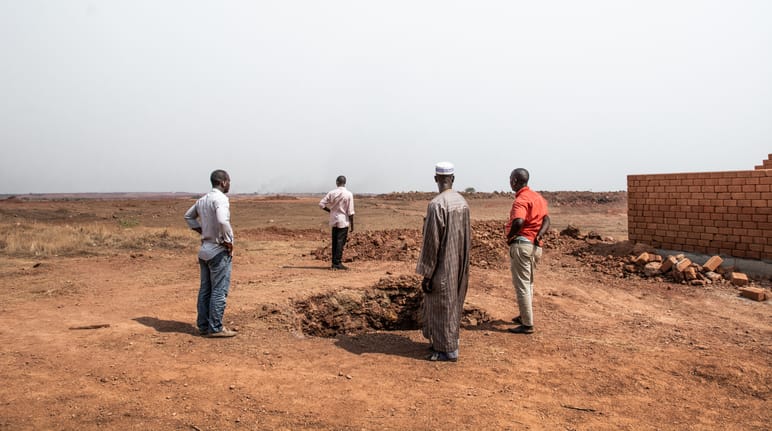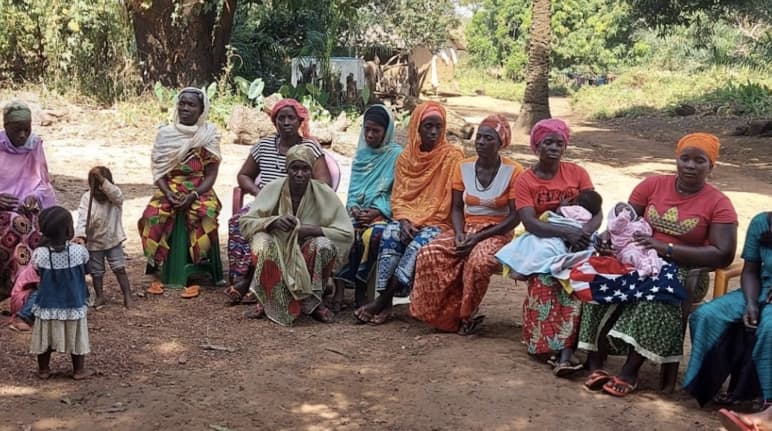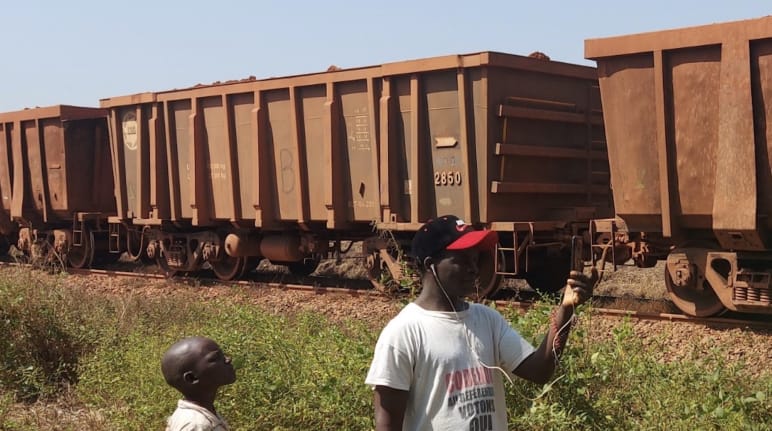Germany’s aluminum boom, Guinea’s environmental doom: Take action now!
Aluminum is a crucial raw material for Germany’s automotive and packaging industries. However, bauxite extraction at the Sangaredi mine in Guinea – an operation enabled in part by German loan guarantees – has been associated with serious human rights abuses and extensive environmental damage.
Call to actionTo: the German Ministry for Economic Affairs and Climate Protection
“Ensure that international trade and investment support measures guarantee the human rights of local communities.”
Raw materials for industry in rich countries are often extracted under environmentally and socially destructive conditions in the global South. A shocking example is bauxite from Guinea in West Africa, which is used to produce aluminum.
The waters and soil surrounding the Sangaredi bauxite mine are heavily polluted and large areas of forest have been cleared, destroying the livelihoods of 20 villages. The mining company, Compagnie des Bauxites de Guinée (CBG), has shown little interest in mitigating or reversing the damage it caused.
The German government is directly implicated in this issue: ING-DiBa AG, a German bank, granted CBG a loan of 248 million euros, with both the principal and interest covered by a government guarantee. And while CBG was required to adhere to the World Bank’s social and environmental standards, these have clearly not been upheld.
In 2019, 13 affected villages filed a complaint with the World Bank’s arbitration board. However, no resolution has been reached, and the proceedings are still ongoing.
In 2021, we urged the German Ministry for Economic Affairs and Climate Protection to stop issuing loan guarantees for projects that violate human rights and environmental standards.
Despite this unwelcome publicity, the ministry has not provided an explanation as to why the German government continues to guarantee this loan, given its stated social and environmental criteria. Investigations conducted before the loan was granted classified the risk of human rights violations as very high.
The affected villagers demand that the German government ensures:
- their livelihoods are preserved
- forced relocations are prevented
- the entire mining area is rehabilitated
- compensation is provided transparently, fairly, and without discrimination.
Please support these demands by signing our petition. Rainforest Rescue, PowerShift, and FIAN will deliver this petition to the German Ministry of Economic Affairs.
BackgroundApproximately 90 percent of Germany’s bauxite imports originate from Guinea, and are mainly used to produce aluminum for cars, packaging, and energy generation.
In 2016, the public-private mining company “Compagnie des Bauxites de Guinée” (CBG) received $823 million from international lenders to significantly increase production at its bauxite mine near the town of Sangaredi.
This expansion threatens to displace 13 villages. CBG has already appropriated large portions of the communities’ agricultural land. Residents were inadequately compensated, others received no compensation at all for their loss. Bauxite mining has depleted and polluted local water sources, leaving them unsuitable for drinking. Consequently, communities can no longer sustain themselves adequately. Women must now travel farther to fetch water, without any compensation for this additional burden.
In February 2019, the 13 communities filed a complaint with the World Bank. Despite the mediation’s postponement due to the COVID pandemic, CBG proceeded with the forcible relocation of the village of Hamdallaye in 2020. The new village site, built on a spoil heap, is unsuitable for agriculture. CBG only installed public water taps after pressure from nongovernmental organizations.
Germany’s responsibility
The German government bears a great responsibility for the human rights impacts on communities affected by the mining operations: It secured a loan from the ING-Diba AG bank for the expansion of the bauxite mine amounting to $293 million through an Untied Loan Guarantee (UFK Guarantee). The World Bank is also supporting the mine expansion with a $200 million loan from its subsidiary IFC. The funds were approved despite impact assessments of the mine expansion that warned of high ecological and social risks.
Research on the ground
For three years, FIAN, PowerShift, Rainforest Rescue and CorA have been supporting those affected vis-à-vis the German government. FIAN’s research in Guinea has shown that the extent of human rights violations is more serious than we were aware of. In December 2022 and 2024, FIAN investigated the human rights situation on the ground in the area of the Sangaredi bauxite mine.
More than 20 villages are affected by the expansion of the Sangaredi mine. The mining company is digging up their agricultural land, clearing forests and destroying their water resources. Houses are cracking and walls are collapsing due to shock waves from blasting in the mine.
Bauxite dust heavy with silicon hangs in the air and damages people’s respiratory tracts. It also settles on plant flowers and prevents their pollination. Trees bear fewer fruits and yields of grain and vegetables are declining as a result. Fish – a vital source of protein for the population – are dying due to water pollution.
The residents of the village of Hamdallaye, which was relocated to a former mining site, were promised that good soil would be reapplied and trees planted, but the reality is starkly different. The company has announced the expansion of the mine into the agricultural land and forests of other villages. The residents now fear the destruction of their livelihoods as well.
Inadequate compensation
The mine operator CBG is a partnership of the Guinean state and a consortium of three multinational mining corporations. The company’s compensation for the destruction of the affected villages’ livelihoods has been woefully inadequate. While it has installed pumps to compensate for polluted surface waters, the water is unsuitable for drinking due to high iron content.
A borehole does not replace a river. The river fulfills many more functions for us than just providing drinking water.” -a Hamdallaye villager
Paid compensations are inadequate and non-transparent. Income-generating projects such as a bakery, animal husbandry and horticulture were poorly implemented and have failed. Villagers report that promised food aid consisted of one bag of rice, five liters of oil, and one kilogram of sugar per person.
Contrary to legal provisions, CBG has offered virtually no jobs to local people, who can only find work with subcontractors under poor conditions. Because their poverty has worsened, parents had to take their children out of school. The village chief of Hamdallaye observed: “Even if someone promises to pay monthly (for the land), it is better to get work. Even if someone says they will replace the (contaminated) soil, it is better to leave the (healthy) soil where it is.”
Irresponsible banks
The expansion of the mine was only made possible by loans from international banks, including the World Bank subsidiary International Finance Corporation (IFC). Due to the serious impacts of the Sangaredi mine on human rights, three nongovernmental organizations supported 13 villages in filing a complaint with the IFC’s ombudsman in 2019. In the mediation that followed, the parties have so far agreed on the distance to be maintained from the villages when blasting. However, according to those affected, the company is not adhering to the agreement.
It is evident that the German ING-DiBa bank made its decision regarding the loan solely based on its profit interests. For providing 248 million euros, it will be collecting 218 million euros in interest over the course of twelve years.
Securing the raw material needs of German industry is apparently more important to the German Ministry of Economics than protecting human rights and the environment.
Aluminum can be remelted and further processed without loss of quality. If the German government were to consistently require this from companies, demand for bauxite would be significantly lower.
To: the German Ministry for Economic Affairs and Climate Protection
Ladies and Gentlemen,
Since 2016, the German government has supported a bauxite mine operated by Compagnie des Bauxites de Guinée (CBG) in Guinea. The mine has severely impacted the environment by polluting water sources, destroying fertile soil, and causing deforestation. Consequently, the corporation has devastated the livelihoods of approximately 20 villages, which remain inadequately compensated. The company has demonstrated minimal effort to address or mitigate the extensive damage it has caused.
The German bank ING-DiBa AG extended a loan of 248 million euros to CBG, with the German government guaranteeing the loan and its interest payments. A critical condition of this guarantee was the borrower’s compliance with the World Bank’s social and environmental standards. However, the mine continues to fall short of these requirements. In 2019, 13 affected villages filed a complaint with the World Bank’s mediation panel, and the process remains unresolved.
Prior to loan approval, CBG’s practices were thoroughly reviewed, revealing a very high risk of potential human rights violations.
A pressing question remains: Why has the Ministry for Economic Affairs and Climate Protection failed to explain the government’s continued loan guarantee for a company that blatantly disregards essential social and environmental criteria?
- preserve local livelihoods
- prevent forced relocations
- fully restore the entire mining area
- provide transparent, fair, and non-discriminatory compensation
- implement best mining practices in new areas to protect water resources, soils, and forests from irreparable damage and
- participate as an observer in the mediation process to exert pressure on CBG and promote more cooperative engagement.
This petition is also available in the following languages:
Help us reach 50,000:













